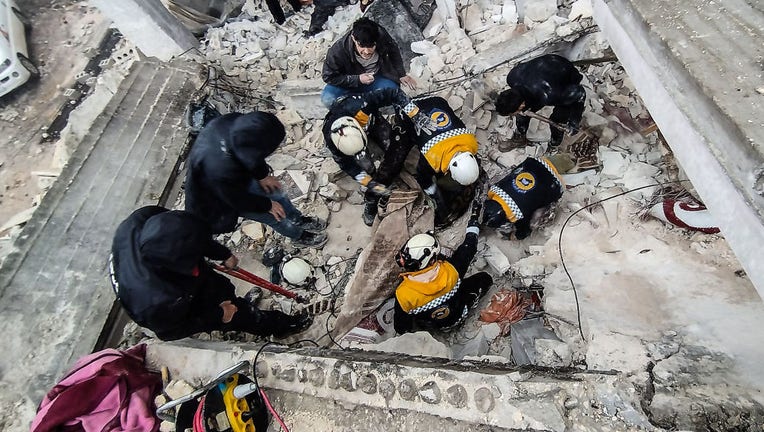The Vallejo engineering firm that saved lives in Turkey quake

The scene after houses were destroyed in an earthquake with a magnitude of 7.8 that occurred in the Pazarck district of Kahramanmara in Turkey. (Photo by Ugur Yildirim/ dia images via Getty Images)
VALLEJO, Calif. - The devastating earthquakes that rocked Turkey and Syria on Monday have caused the deaths of over 23,000 people and the destruction of over 5,600 buildings and left the region a disaster area, but a company based out of Vallejo may have saved more lives from being lost.
Earthquake Protection Systems, housed in a 12-acre factory on Mare Island, builds gigantic "friction pendulum bearings" called seismic isolators, which essentially place huge structures like buildings, bridges and refineries on shifting plates that absorb the shock of large quakes.
EPS has been shipping its massive shock absorbers all around the world since 1987 and has "several thousand" installed in Turkey, according to company founder Victor Zayas.
The systems were in place at the epicenter of the seismic activity in a large hospital in Adana, Turkey, and remained 100 percent functioning after the 7.8- and 7.5-magnitude quakes hit nine hours apart, according to Zayas.
"The entire area was devastated," Zayas said Thursday.
"Our hospital was bar far the biggest hospital in the entire area." Though many buildings in the region had been built to code to protect them from quakes, many of them still failed after being struck this week, but not buildings with EPS. At least nine hospitals in the area without the seismic isolators in place collapsed, according to a report from the company compiled after Monday's disaster, with over 30 hospitals remaining standing but losing all functionality.
This has been Zayas' life goal: Not only to keep buildings standing during large quakes, but to keep them up and running, especially places like hospitals.
EPS protected buildings in Turkey are upwards of 12 stories tall. The hospital with EPS was able to immediately care for 3,000 patients after the disaster stuck, Zayas said.
Over the years, the systems have protected at least 18 structures around the world from earthquakes, from South America to New Zealand.
"We now have the proof that our engineering theories actually work in practice," said Zayas. Zayas is an open and affable person that readily gives tours of his massive factory tucked at the far end of Mare Island, which holds an impressive quake simulator that is used to test his products. EPS is housed in a former Navy structure.
The first test for his products in Turkey came in 2020 when the city of Elazig was hit with a 6.7-magnitude quake, which just so happens to have three hospitals equipped with EPS. While 87 multi-story buildings collapsed, the EPS hospitals remained standing and fully functional.
The bearings Zayas' company produces range in size from a few feet across to colossal saucers. In the Bay Area, they can be found supporting the Benicia-Martinez Bridge, Zuckerberg San Francisco General Hospital, Stanford Medical Center, the Mills-Peninsula Medical Center in Burlingame, Cathedral of Christ the Light in Oakland, the Dumbarton Bridge, and the Apple campus in Cupertino.
Zayas wants to improve building codes around the world, most of which still leave room for a percentage of total collapses or loss of functionality. Simply allowing people to walk out of a building alive is not enough, he said. Critical buildings must remain in operation.
"For 50 years building codes have only sought to limit structure collapses to less than ten percent," said the report from EPS. "Building codes need to be updated to specify criteria that minimize earthquake damage, and not just limit damages to less than ten percent. That would avoid most collapses and also save many lives by keeping most hospitals functioning."
For Zayas and his 80-plus member engineering firm, human resilience is at the base of their operations.
"I believe we have saved a lot of lives," he said.

